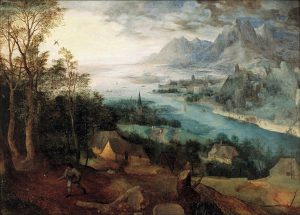Thoughts on Sunday’s Lessons for July 12, 2020
First Reading (Track One): Genesis 25:19-34
God promised that Abraham’s descendants would be as numerous as the stars of heaven. But the ancestral legends of the chosen people show us that this outcome won’t be easy.

Landscape with the Parable of the Sower (1552), oil painting on panel by Pieter Bruegel the Elder (1526/1530-1569). Timken Museum of Art, San Diego, Calif. (Click image to enlarge.)
Abraham and Sarah had to wait until she was 90 years old before the miracle of Isaac’s birth. In Sunday’s Track One first reading we recall that Isaac and Rebekah, too, prayed for 20 barren years before their twins, Esau and Jacob, were born. Jacob, a notorious trickster, talks his moments-older sibling, in a moment of hunger, into giving up his rights as firstborn in trade for a bit of bread and a pot of lentil stew. Jacob’s tricks reveal once more that God does not choose unbelievably perfect people, but works through flawed and sinful humans.
First Reading (Track Two): Isaiah 55:10-13
In Sunday’s Track Two first reading we hear the concluding verses of second Isaiah. This is the second of the three ancient prophets who bible scholars believe participated in writing this memorable book. Overall, the three writers tell of the chosen people’s exile to Babylon and their eventual return home to Jerusalem, where they build a restored temple. In these verses, having assured the people that God has forgiven their failures of justice, Isaiah in these verses paints a beautiful image of God as the giver of life and sustenance and all that is good. His image of seeds and the sower and Earth’s bounty sets the stage for Jesus’ parable of the sower that we hear in Sunday’s Gospel.
Psalm (Track One): Psalm 119:105-112
We hear parts of Psalm 119 a dozen times during the three-year cycle of Lectionary readings, so it will probably come as no surprise to hear that its 176 verses make it the longest of all the Psalms. All of those verses are devoted to a long, loving celebration of the Torah, the first five books of the Bible. “Torah” is usually translated in this context as “law,” “ordnance” or “decree” throughout the psalms, but it might be better expressed as “teaching,” a point of view that reveals God’s loving desire for us to live in good relationship with God and each other. Following God’s decrees – God’s teaching – brings joy even in darkness and time of trouble, the Psalmist sings.
Psalm (Track Two): Psalm 65: (1-8), 9-14
This psalm of praise and thanksgiving beautifully reflects Isaiah’s portrayal of God as the generous creator who made the world and all that is in it, and who provides bountiful water and grain, pastures and flocks. Perhaps originally sung as a harvest thanksgiving, it chants praise for the overflowing richness of God’s abundance and for the joy it provides to those who receive it. This abundant seed has fallen on good soil and yielded a hundredfold.
Second Reading: Romans 8:1-11
Paul, a proud Pharisee who considered himself righteous and blameless under the law, the teaching of Torah, now tells the Romans that Christ’s resurrection has freed us from the law of sin and death. If we follow the ways of the world, he warns, we are subject to sin and death. But when we accept God’s Spirit through Jesus, we gain life and peace. Our mortal bodies gain life because the Spirit dwells in us.
Gospel: Matthew 13:1-9, 18-23
For the rest of the season after Pentecost we will follow Matthew’s account of Jesus’ final journey with the apostles from Galilee to Jerusalem. In many of these Gospels Jesus will teach by using parables, colorful, attention-getting metaphors. Sunday we hear the parable of the sower, the first parable that Jesus tells in Matthew’s Gospel and the only parable that Jesus explains. It is tempting to look for specific instruction in the fates of the seeds that fall on the path, on rocks, among thorns, and on fertile ground. Perhaps the message is this simple: Sow God’s word extravagantly, everywhere, and rejoice when it falls on good soil and the harvest is rich. Or are we being told to decide what kind of soil we will choose to be when we hear God’s word? The parables of Jesus don’t come straight at us. They make us think.
